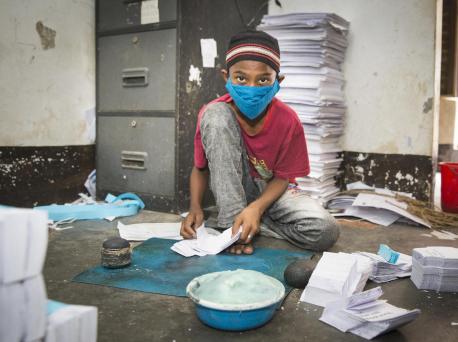
In South Asia, the Impacts of School Closures May Last a Lifetime
COVID-19 pandemic-related school closures have had a profound impact on children's learning and mental well-being. UNICEF is working to help children get back on track.
As the school year winds down for children in the U.S., data shows that 147 million children around the world missed more than half of their in-person school during the first two years of the pandemic. Many did not return to the classroom when their schools reopened.
Research is just starting to reveal the terrible toll of school closures on children's learning and well-being — impacts that could last a lifetime.
In the first two years of the pandemic, children missed 2 trillion hours of in-person learning globally
When schools shut down in South Asia to prevent the spread of COVID-19, 434 million children not only lost their place to learn, but also their relationships and support networks — just as their world was turning upside-down.
Millions also lost their only access to nutritious meals, medical care and their place of safety. Girls lost a place that can keep them safe from child marriage and pregnancy.
Below, three children from South Asia share how school closures have affected their lives and their hopes for the future.
The stress of working full-time in Bangladesh
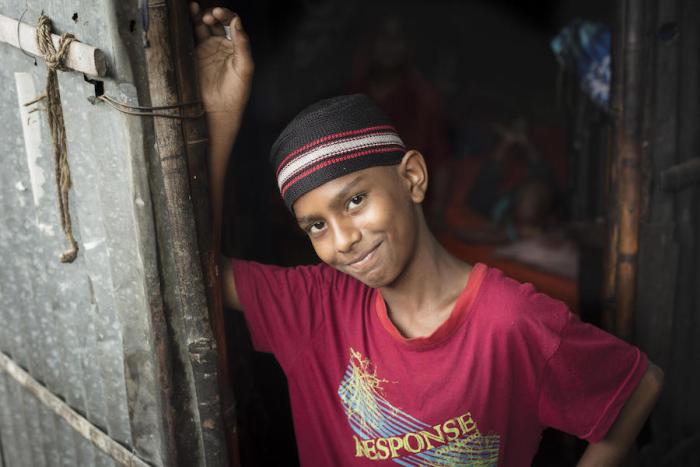
When schools closed in Dhaka, Bangladesh, 11-year-old Imran went from part-time to full-time at a paper recycling shop to earn money to support his family. © UNICEF/UN0574403/Mawa
Before the pandemic, 11-year-old Imran's family was surviving on a few dollars a day in Bangladesh's capital, Dhaka. His mother, Marufa, worked as a domestic helper. His father, Suleiman, was a rickshaw puller. Imran worked part-time after school, in a paper-recycling shop, to help out.
But when lockdowns hit, Imran's family, like millions of others in South Asia, watched their source of income dry up overnight. They moved back to their small shelter in the village of Netrokona, five hours north of Dhaka. But without any land to farm, they struggled to earn a living.
With no school to attend, his father unwell and the family facing financial crisis, Imran returned to the capital alone to work at the paper recycling shop — full-time. His hours were 9 a.m. to 10 p.m., and there were no other children his age at the shop.
"I started feeling really sad and dejected," Imran said. "I kept asking the social worker to take me to my parents."
I started feeling really sad and dejected. I kept asking the social worker to take me to my parents. — Imran, 11
When lockdowns forced the recycling shop to close, Imran heard about a UNICEF-supported Emergency Child Protection Services hub in the area run by a social worker named Azad. At the hub, Iman was able to access health care, life skills classes and counseling services. Azad also arranged a visit to Imran's village so he could see his family, whom he'd been missing terribly.
"Azad took me to Netrokona," said Imran. "My parents were very surprised to see me and started hugging me."
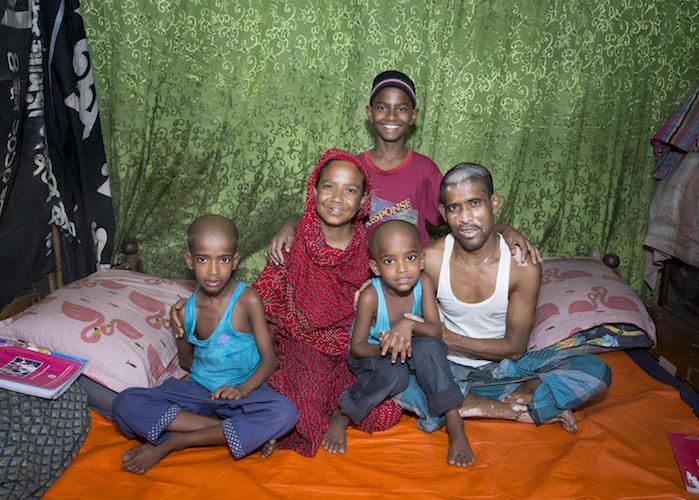
Imran, in red shirt, with his parents and two brothers, in their one-room home in Dhaka, Bangladesh on May 30, 2021. © UNICEF/UN0574412/Mawa
When the lockdown ended, the whole family moved back to their one-room home in Dhaka. Imran is back to working long hours at the recycling shop to support his family. He is paid $35 a month, which he gives to his mother. He's happy to be reunited with his family, but he yearns to go back to school.
"If I can study, I will get a better job and take better care of my parents," he said. "I want to keep my parents happy when I grow up."
Unequal opportunities for girls in Pakistan
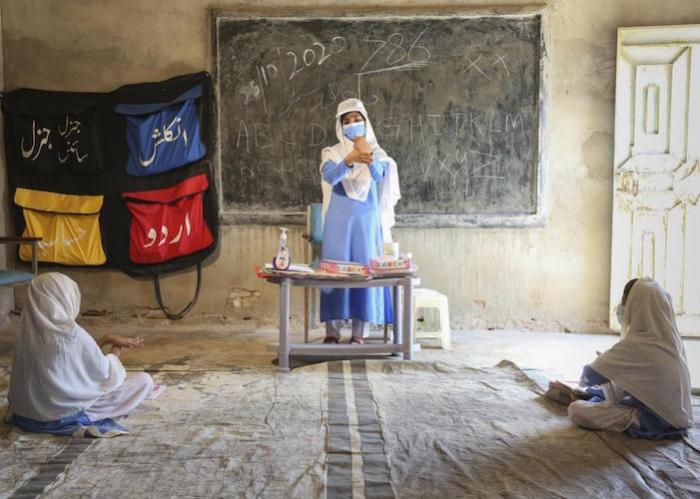
After schools closed in rural Balochistan, Pakistan, to prevent the spread of COVID-19, 14-year-old Mahnoor, center, set up a learning center in her family's home. © UNICEF/UN0593686/
Growing up in rural Balochistan, Pakistan, 14-year-old Mahnoor has always been an advocate for girls' education. But when schools closed, she watched children in her village stop learning completely.
"We don't have teachers in our village," she said. "I saw that the girls, especially, were not getting education. Their time was going to waste."
Before the start of the pandemic, more than 12 million girls in Pakistan between the ages of 5 and 16 were already out of school. After schools shut their doors, Mahnoor knew that the longer they stayed closed, the more likely girls would never return.
She decided to take matters into her own hands, and set up a learning center in her family's home.
I wanted to educate kids, especially girls. I set up a center at home, with the help of my parents, and started teaching children there. The children were so happy to come and learn. — Mahnoor, 14
At Mahnoor's center, children learned about staying safe from COVID-19, and the girls got together to learn. But Mahnoor says the biggest challenge is changing attitudes toward girls' education in her community. "My parents have always supported my education, but attitudes toward girls' education aren't always positive, and not enough is given to girls' education."
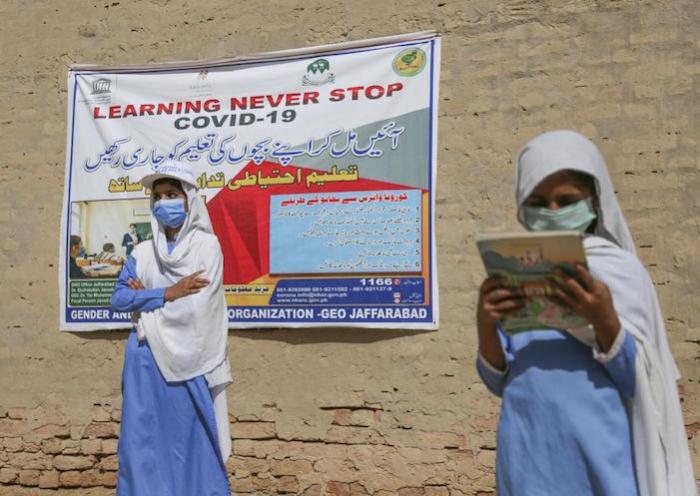
Fourteen-year-old Mahnoor, left, with one of her students outside the learning center she set up to encourage children in her neighborhood to keep learning. © UNICEF/UN0593680/
One of the biggest hurdles preventing girls from accessing education is a lack of learning facilities for girls in rural areas.
"The girls' school is 20 kilometers away. Girls can't go that far alone," Mahnoor said. "Even if there are schools for girls, then there are no facilities, no washrooms in the school. Boys go to the field. Where do girls go?"
Mahnoor says her goal is to promote the importance of schooling for girls in her area. She wants to make parents aware of how children need to keep learning — particularly when schools close or classes are interrupted.
"I have big dreams," she said. "This world can be a better place. The best way is to get your kids educated."
Struggling to keep up without TV or smartphone access in Bhutan
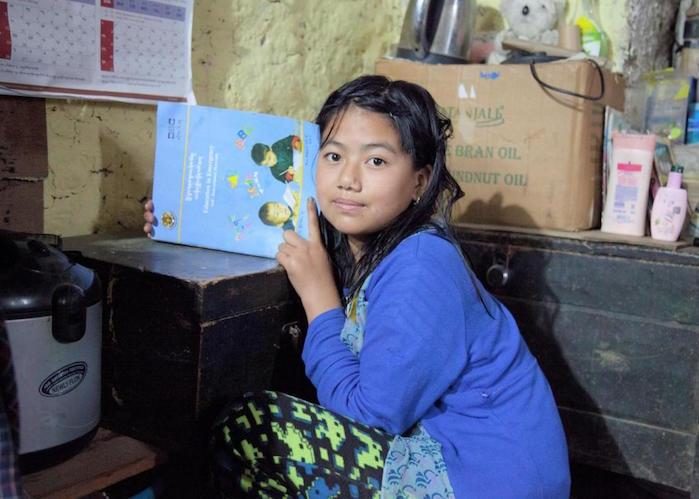
Without a TV or smartphone at home, accessing remote education during the pandemic has been stressful for Dechen, 11, in Bhutan. © UNICEF/Bhutan/Lhendup
Eleven-year-old Dechen wants to be a teacher when she grows up. She's one of about 17,000 students in Bhutan and 147 million in South Asia who have struggled through school closures without access to a TV, computer, smartphone or internet at home. But that hasn't stopped her determination to learn.
For much of the time schools have been closed in Bhutan, Dechen has studied at her friend and neighbor Pema's house. The two girls watch lessons on Pema's family's TV and take turns using the family's smartphone to access their assignments on Google classroom. "I wait for her to complete her homework first," said Dechen. "Then I work on mine."
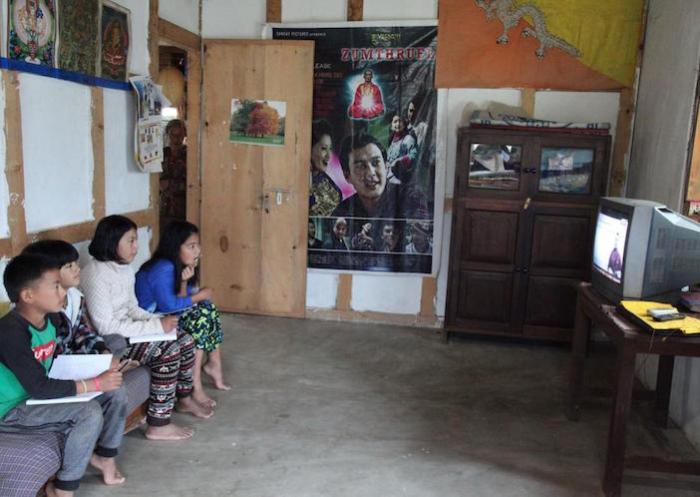
In Bhutan, Dechen, in blue shirt, joins other children watching lessons on TV at her friend and neighbor Pema's house. © UNICEF/Bhutan/Lhendup
Unfortunately, research shows that remote learning has been no substitute for the in-person classroom experience, and children with the least, like Dechen, have lost out most in their learning.
I don't like staying home ... I miss my school, my teachers and my friends.” — Dechen, 11
"I don't understand much when I watch on TV," Dechen said. "At school, the teacher explains until we understand the lessons, but on television, the lessons go very fast and we can't catch up ... I don't like staying home. At school, we play and study. I miss my school, my teachers and my friends."
UNICEF is working with partners around the world to support children coping with psychological stress and learning loss related to the COVID-19 pandemic. Your contribution can make a difference. Please donate.
Top photo: During the pandemic lockdown in Dhaka, Bangladesh, 11-year-old Imran started working 9 a.m. to 10 p.m. at a paper recycling shop, making paper bags. He longs to return to school. © UNICEF/UN0574417/Mawa


